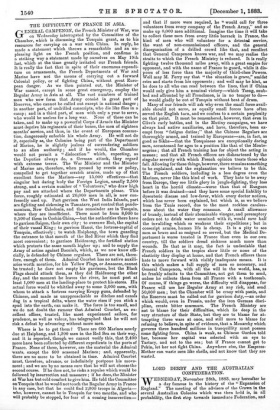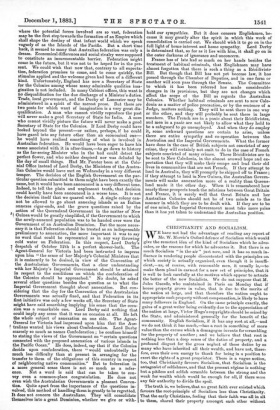LORD DERBY AND THE AUSTRALIAN CONFEDERATION.
WEDNESDAY, November 28th, 1883, may hereafter be a day famous in the history of the "Expansion of England." The meeting of the advisers of the Crown in the several Australian Colonies which was then held is, in all probability, the first ctsp towards immediate Federation, and
where the potential forces involved are so vast, federation may be the first step towards the formation of an Empire which shall shape the destiny of that infant world which we speak vaguely of as the Islands of the Pacific. But a short time back, it seemed to many that Australian federation was only a dream. Economical differences and social rivalry were supposed to constitute an insurmountable barrier. Federation might come in the future, but it was not to be hoped for in the pre- sent. We could wish that now that, contrary to all expecta- tion, federation promises to come, and to come quickly, the stimulus applied and the welcome given had been of a different kind. Unfortunately, England has now a Secretary of State for the Colonies among whose many admirable qualities ima- gination is not included. In many Cabinet offices, this want is no disqualification for the due discharge of a Minister's duties. Trade, local government, and the Duchy of Lancaster may be administered in a spirit of the merest prose. But there are two posts for which want of imagination is a very great dis- qualification. A man who cannot vividly reproduce the past will never make a good Secretary of State for India. A man who cannot vividly picture the future will never make a good Secretary of State for the Colonies. If Lord Derby could have looked beyond the present—or rather, perhaps, if he could have gazed into any future other than an economical one— he would have realised something of what is involved in Australian federation. He would have been eager to have his name associated with it in after-times,—to go down to history as the far-seeing Minister who in the bud could detect the perfect flower, and who neither despised nor was deluded by the day Of small things. Had Mr. Forster been at the Colo- nial Office instead of Lord Derby, the Ministers of the Austra- lian Colonies would have met on Wednesday in a very different temper. The decision of the English Government on the par- ticular question submitted to them might have been exactly the same, but it would have been announced in a very different tone. Indeed, to tell the plain and unpleasant truth, that decision could hardly have been announced in a worse tone. It is not the decision itself that we quarrel with. A single colony can- not be allowed to go about annexing islands as an Italian annexes cigar-ends, and the grave questions raised by the action of the Queensland Government in the matter of New
II Guinea would be greatly simplified, if the Government to which the newly-annexed population was to be handed over were the Government of an Australian Dominion. But the more neces- sary it is that Federation should be treated as an indispensable preliminary to annexation, the more important it was to say no word that could be represented as in any way throwing cold water on Federation. In this respect, Lord Derby's 7 despatch of October 12th is a perfect shower-bath. The Agent-General for Victoria had been instructed to impress upon him "the sense of her Majesty's Colonial Ministers that it is eminently to be desired, in view of the Convention of the Australasian Governments, that a clear understanding with her Majesty's Imperial Government should be attained in respect to the conditions on which the confederation of the Colonies should be approached." No doubt, he asked several other questions besides the question as to what the Imperial Government thought about annexation. But con- sidering that the day for the Convention of the Australasian Governments was actually fixed, and that Federation in its first initiative was only a few weeks off, the Secretary of State might have said something implying his sense that the occa- sion was a remarkable one. Lord Derby said nothing that could imply any sense that it was an occasion at all. He left the whole subject of annexation on one side. The Agent- General for Victoria had impressed upon him that the Aus- tralians wanted his views about Confederation. Lord Derby scarcely so much as names Confederation ; he confines himself to stating the views of the Government on "certain questions connected with the proposed annexation of various islands in the Pacific Ocean." He does, indeed, say that if the Colonies decide upon confederation, there "would undoubtedly be much less difficulty than at present in arranging for the transfer to them of the obligations of this country in respect of neighbouring native communities." But to federation in a more general sense there is not so much as a refer- ence. Not a word is said that can be taken to con- vey even a common-place congratulation. He does not even wish the Australasian Governments a pleasant Conven- tion. Quite apart from the importance of the questions in- volved, this method of handling them is greatly to be regretted. It does not concern the Australians. They will consolidate themselves into a great Dominion, whether we give or with-
hold our sympathies. But it does concern Englishmen, be- cause it may greatly alter the spirit in which this work of consolidation is carried out. We should wish it to go on in the full light of home interest and home sympathy. Lord Derby is determined that, so for as it lies with him, it shall go on in the outer darkness of ignorance and unconcern.
France has of late had so much on her hands besides the treatment of habitual criminals, that Englishmen may have almost forgotten that there is such a thing as a B4cidiviste Bill. But though that Bill has not yet become law, it has passed through the Chamber of Deputies, and in one form or another will soon pass through the Senate. The Committee to which it has been referred has made considerable changes in its provisions, but they are not changes which affect the scope of the Bill as regards the Australian Colonies. Whether habitual criminals are sent to new Cale- donia.as a matter of police precaution, or by the sentence of a Judge, matters nothing. They will be sent there in one way or the other, and they will probably be sent there in large numbers. The French are in a panic about their Recidivistes, and men in a panic are not likely to allow what they hold to be a safeguard to go unemployed. And when they do employ it, some awkward questions are certain to arise, unless there are entire sympathy and co-operation between the Australian and the Imperial Governments. What the former have done in the case of British subjects not convicted of any crime, they will certainly not omit to do in the case of French subjects convicted of many crimes. These Recidivistes are to be sent to New Caledonia, in the almost avowed hope and ex- pectation that they will make their escape and lead their old lives in communities that are not French, If they attempt to land in Australia, they will promptly be shipped off to France ; if they attempt to land in New Guinea, the Australian Govern- ments will make annexation more of a reality than Queens- land made it the other day. When it is remembered how nearly these prospects touch the relations between Great Britain and France, it is surely well that Great Britain and her Australian Colonies should not be of two minds as to the manner in which they are to be dealt with. If they are to be of one mind, the Imperial Government must take more pains than it has yet taken to understand the Australian position.







































 Previous page
Previous page